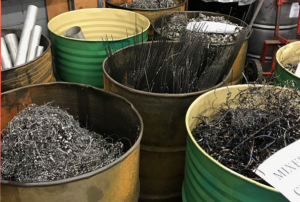Have you visited a preschool classroom lately? They’re filled with little scientists running experiments. Give a preschooler a few magnets and he’ll probably try to stick them to wooden blocks, books, stuffed animals or his own body – with no luck, of course. It doesn’t take long for kids to figure out that magnets only stick to certain surfaces, especially shiny metal ones. Other metal surfaces won’t work. Without even realizing it, those curious kids are studying the differences between ferrous and non-ferrous metals.

Ferrous Vs. Non-Ferrous Metals
Simply put, ferrous metals contain iron and non-ferrous metals don’t. (Ferrous comes from “ferrum,” the Latin word for iron.) Ferrous metals are extremely durable, so they’re widely used for construction and infrastructure projects as well as in manufacturing. Bridges, skyscrapers, cars, appliances and heavy-duty fencing are commonly made out of ferrous metal.
Different types of ferrous metals contain iron in different quantities. Cast iron is typically comprised of anywhere from 2 to 5 percent carbon, while wrought iron contains so little carbon that it’s almost pure iron. Steel is another common class of ferrous metals. It’s made of iron, carbon and sometimes other elements including chromium and nickel.
By contrast, non-ferrous metals contain no iron (or contain iron in quantities too small to measure). Common non-ferrous metals include copper, aluminum, tin, lead, zinc and brass.
Is Ferrous Metal Magnetic?
If two objects are magnetically attracted to one another, you can safely assume that they’re both made with ferrous metal. Iron has magnetic properties because of the way its electrons are arranged, so metals that contain iron are magnetized.
Ferrous metals are also known for their tendency to rust. Iron is prone to corrosion, especially when it’s exposed to water. That’s why ferrous metals that are used outdoors can develop rust quickly. (Non-ferrous metals don’t corrode. So if your lawn chairs turn rusty but your metal watering can doesn’t, that’s a good indication that they’re made of different types of metal.)
Recycling Ferrous vs Non-Ferrous Metals
To recyclers, the differences in ferrous vs. non-ferrous metals are significant. Because ferrous metals rust easily, not all ferrous scrap is salvageable. Pieces that are badly corroded may not be worth processing. That being said, most iron and steel scrap metal can be recycled.Even better, because of its magnetic properties, recyclers can use powerful magnets to quickly separate the ferrous metal from the nonferrous stuff.
Recycling ferrous metals is a huge part of what we do, largely because so much iron and steel is scrapped every year. (The U.S. Geological Survey estimates that in 2016 alone, 143 billion pounds of iron and steel scrap was processed throughout the world!) Miller Recycling buys steel, cast iron, nickel alloys and light iron, which includes things like sheet metal and many household appliances.
Do you have obsolete ferrous metal sitting around and taking up space? Miller Recycling pays top dollar for scrap! We’ll pick it up or accept it as delivery at our facility in Mansfield. Turn your unused metal into cash by calling us today.

